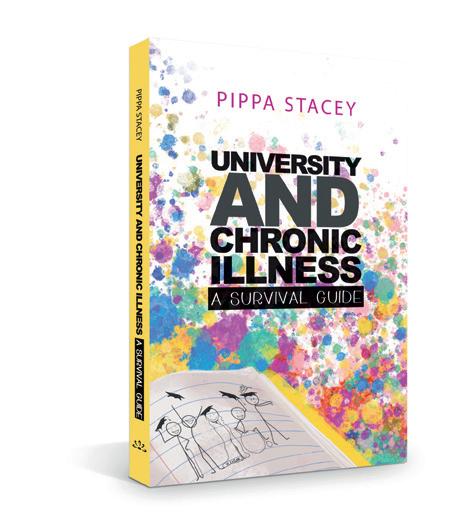
4 minute read
A NEW WAY OF LEARNING
A NEW WAYOF LEARNING
BY PIPPA STACEY
Advertisement
The landscape of higher education looks quite different as students start the new academic year. A mix of attended and remote learning will be the order of the day, which will be a positive for many disabled students, but why has it taken a pandemic to enforce these reasonable adjustments?
It’s been a difficult few months for students beginning or returning to higher education. How the next academic year will unfold could be anybody’s guess, but it looks as though the majority of people will be studying at least part of their degree remotely. To me, that decision makes sense. Students will be able to study from home, because doing so would be in the best interests of their health. However, this very adjustment has consistently been denied to disabled and chronically ill students for years and years.


Overall, I adored my own time at university, but the challenges I faced due to my energy-limiting chronic illness highlighted a real lack of genuine understanding from my university. Although they were willing to be lenient with my attendance, and recognised the fact that I simply wasn’t well enough to attend all my contact hours, they weren’t even open to discussing whether the lectures I missed could be recorded so that I could watch them and study from home.
Even though other departments offered this by default, the explanation from Disability Services was that the technology set-up this required wasn’t possible for my course. And instead of initiating further discussion as to how we could get around this, their curt suggestion was that if I was struggling to attend contact hours, perhaps I should be taking a year out instead.
At the time, I was of course upset and incredibly disheartened by this response. It wasn’t until years later that I fully realised that it was discrimination too: something that prohibited me from having the same educational experiences as my non-disabled peers. However, I’d like to think I got the last laugh. I taught the majority of my degree to myself, mostly, from bed, and still graduated with a 2:1 in 2016.
Since then, further discussions with chronically ill students has shown that my experiences were far from unique: far
too many people have struggled to have their needs taken seriously in higher education. Disabled students have been campaigning for years to try and make these systems more inclusive, but progress has been slow. That is, however, until a certain global pandemic entered our lives in 2020.
As a result of the coronavirus, universities were forced to adapt their teaching methods to accommodate remote learning. The reasonable adjustments that disabled students had requested and were denied were suddenly implemented and fully functional; a change that happened practically overnight, with minimal additional costs to departments. In all honesty, I spent a good couple of weeks feeling rather disheartened over these changes. There’s something very telling about the fact that universities only felt that these adaptations were necessary once their non-disabled students needed them too.
However, I’m now choosing to see this turn of events as something that could actually be a huge win for future chronically ill students. Perhaps universities being forced to accommodate remote learning could be the window that facilitates more inclusive practice in higher education in the future. Now that we’ve all seen that reasonable adjustments like these can be accommodated, universities simply have no valid excuse not to offer it to chronically ill students moving forward.
As for me, my own experiences of being a chronically ill student led me to think about how I could share all that I’d learned, and all the things I wish I’d had somebody to tell me back then… and before I knew it, I found myself writing my debut non-fiction book, University and Chronic Illness: A Survival Guide.
The book is a comprehensive guide to navigating all elements of student life with a fluctuating health condition. I’ve aimed to make it a chatty and humorous, yet balanced and informative, resource: one that’s sincere and realistic about the challenges of studying with a chronic illness, yet one which will empower future students to make informed decisions and really get the most out of their time at university.
More than anything else, I hope it reminds chronically ill students that they’re not alone. I get it: it can be so incredibly tough, and there’s still so much work we have to do. However, with the right support in place, I firmly believe it could be one of the very best experiences of your own life as well.
In the meantime, here’s to the new cohort of disabled students beginning their university journey! I believe in you, and I hope you believe in you too. You can purchase a copy of University and Chronic Illness: A Survival Guide, and Pippa’s new eBook, How To Study Online, by visiting lifeofpippa.co.uk/shop, and you can join in the conversation on social media using #ChronicStudying. You can also follow Pippa on Instagram at @lifeofpippa, and Twitter at @lifeofpippa_.






